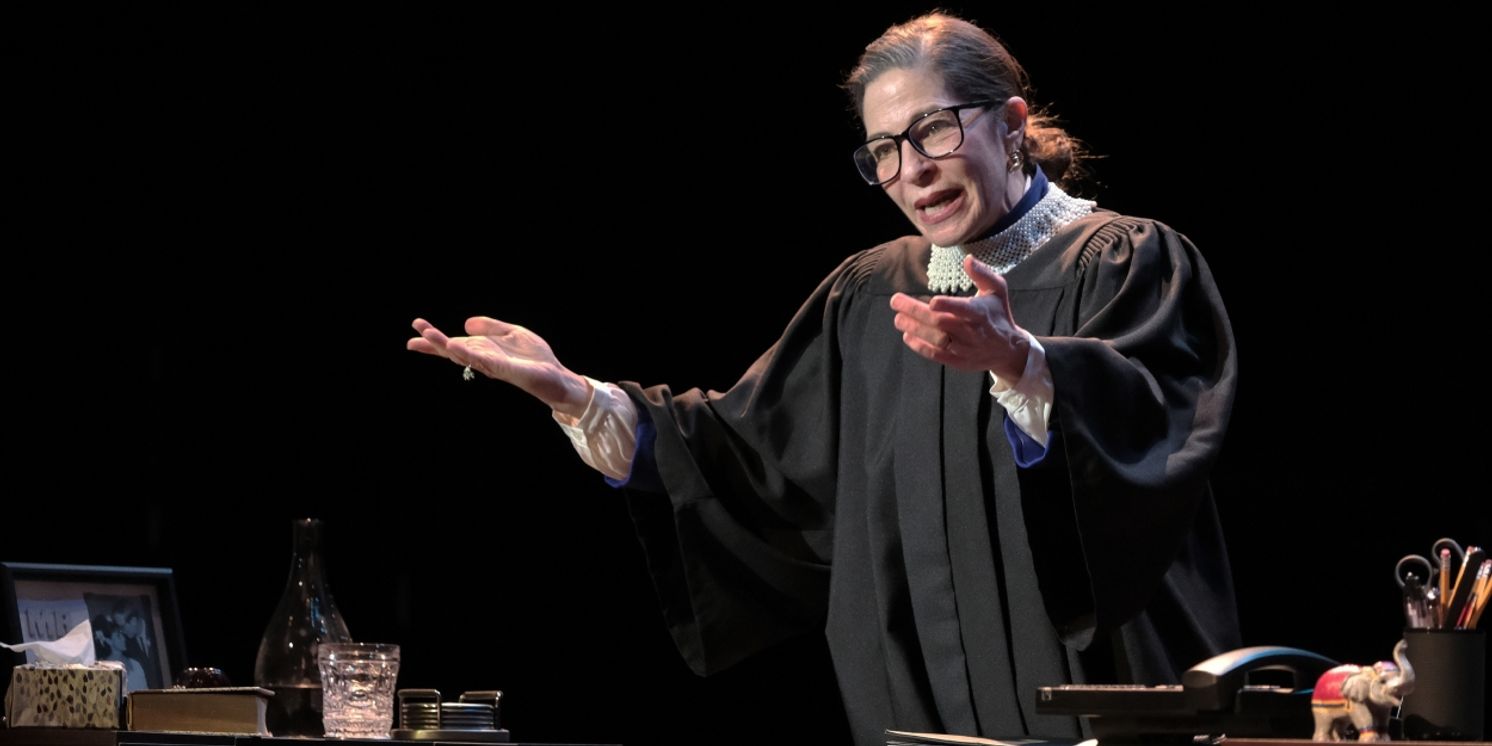Review: ALL THINGS EQUAL: THE LIFE & TRIALS OF RUTH BADER GINSBURG does justice to its subject at Emerson Colonial Theatre
After sold-out Boston run, show continues on the road

Ruth Bader Ginsburg, a self-described “flaming feminist litigator,” was known in her later years as “Notorious RBG,” by people of all ages who appreciated the role she played in making the world more equal.
In “All Things Equal: The Life & Trials of Ruth Bader Ginsburg,” a one-person touring show which played two sold-out shows at Boston’s Emerson Colonial Theatre recently, playwright Rupert Holmes offers a compact yet winningly detailed look at the life of the legendary jurist – from losing her mother while in high school to later raising her own daughter, caring for an ill husband while a Harvard Law student, dealing head-on with her own cancer battles, and arguing seminal cases involving human rights before the Supreme Court.
It was during her tenure as only the second female associate justice on the United States Supreme Court (1993–2020), of course, that Ginsburg had her greatest impact.
Dramatist Holmes – a Tony Award winner for Best Original Score and Best Book for a Musical for 1985’s “The Mystery of Edwin Drood” – has had prior success with solo-person shows. In 2003, Holmes earned a Tony nomination for Best Play for “Say Goodnight, Gracie,” which traced the life of legendary comedian and actor George Burns. The play, with original Broadway star Frank Gorshin, came to Boston’s Wilbur Theatre in October 2003 on national tour. And, in case you’re wondering, Holmes is also the singer/songwriter whose “Escape (The Pina Colada Song)” went to number one on the Billboard Hot 100 chart in 1979.
With Ginsburg he delves into another pop culture icon, this time an eminent jurist – played with depth, humor, and abundant appeal by Michelle Azar – whose championing of women’s rights and gender equality, and fiery dissents against conservative rulings, made her a hero of the left, with her image on T-shirts, coffee mugs, and more.
We see the Brooklyn, N.Y., native richly enjoying that fame – while still wishing that she were known as “Victorious RBG” rather than by the “Notorious” sobriquet – and even showing off a few moves when speaking of Kate McKinnon’s portrayal of her in “Saturday Night Live” sketches that had the diminutive justice doing celebratory dances.
The play is far from being all about the laughs, though. It also well details Ginsburg’s impressive legal career, from being the first tenured female factory at Columbia Law School, where she had earlier graduated first in her class, to co-founding the Women’s Rights Project and serving as counsel to the American Civil Liberties Union (ACLU). In very moving fashion, it also chronicles her long, loving marriage to fellow attorney Martin Ginsburg, and his behind-the-scenes efforts to advance her career.
Azar deftly holds the spotlight throughout, while other characters are woven in through Mike Billings’ well-chosen video projections and mood-setting lighting. One such scene details Ginsburg’s unlikely friendship with her fellow Justice and ideological opposite Antonin Scalia, whom she affectionately called “Nino,” which evolved from their shared love of opera. Thanks to Shaughn Bryant’s layered sound design, strains of Puccini filled the Colonial as Azar’s Ginsburg lip-synched along to “Madama Butterfly.”
Under the carefully calibrated direction of Laley Lippard, and on scenic designer Tom Hansen’s dark-paneled set recreating her Supreme Court office, Azar expertly conveys Ginsburg’s distinct vocal sound and spare movements, while Devon Renee Scott’s costume designs recall her fancifully collared judicial robes as well her brightly colored suits.
As “All Things Equal” points out, Ruth Bader Ginsburg had a style all her own and should forever be remembered as someone who made a difference not only because of her keen intellect, but also due to her compassion, humor, and strength of character.
Photo caption: Michelle Azar in a scene from the touring production of “All Things Equal: The Life & Trials of Ruth Bader Ginsburg.” Photo by Bing Liem.
Reader Reviews
Videos

